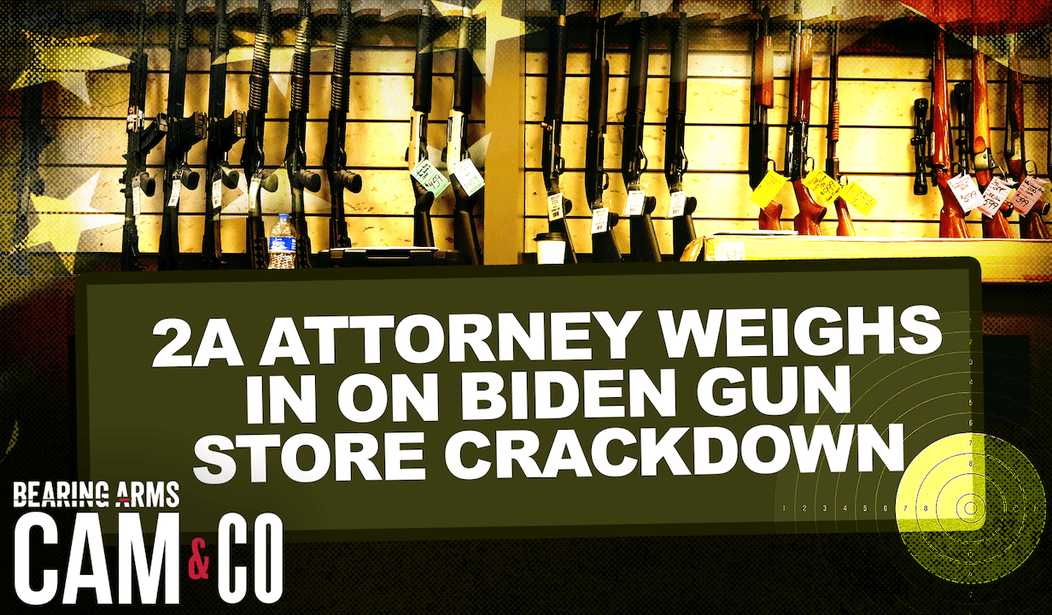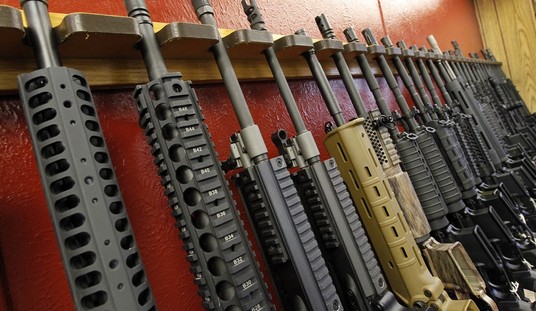It’s a two-fer on today’s Bearing Arms’ Cam & Co, with California Rifle & Pistol Association head Chuck Michel sounding off on Joe Biden’s new plan to enforce a “zero tolerance” policy against gun stores that run afoul of the ATF’s regulations as well as the oral arguments held in the Ninth Circuit Court of Appeals on Tuesday regarding the state of California’s ban on “large capacity” magazines.
Originally I was planning on speaking to Michel solely about the mag ban case, but since he’s dealt with previous attempts by the gun control lobby to demonize gun sellers in the past, I wanted to get his take on Biden’s zero tolerance approach to shutting down gun stores that have even minor violations of ATF rules and regs. Michel was more than happy to weigh in, pointing to some examples of ATF infractions that he’s run across; including one federally licensed firearms dealer who was dinged by the agency over the use of “L.A. County” on a federal form instead of writing out “Los Angeles County.”
Using paperwork violations like that to shut down gun stores is not only an egregious attack on the firearms industry, but is a waste of time and effort if the Biden administration is truly interested in cracking down on violent crime. If, on the other hand, Biden and his anti-gun allies are more interested in using the rising violent crime rate as an excuse to further their gun control agenda, then his new strategy makes some sense.
Targeting legal gun sellers and lawful gun owners, on the other hand, isn’t a new strategy for gun control activists at all. It’s what they do, and California’s magazine ban is a perfect example of the gun control ideology at work. Under the law, which has been declared unconstitutional by both a federal judge and a three-judge panel on the Ninth Circuit, California residents not only are unable to purchase ammunition magazines that can accept more than ten rounds, but are required to turn over, destroy, modify, or remove from the state all “large capacity” magazines that were legally purchased before the ban went into effect.
As Chuck explained in a release to CRPA members:
Yesterday’s oral argument sheds some light on what we can expect from the court now. Indeed, as was expected, many of the judges appeared hostile to CRPA’s position that the statewide ban on magazines capable of holding more than 10 rounds violates both the Second Amendment and the Takings Clause. For instance, several judges focused on how often law-abiding citizens must fire more than 10 rounds in self-defense, seemingly agreeing with DOJ’s claim that that the rarity of such events proves that they are not in “common use” for lawful purposes.
But Judge Lawrence VanDyke, an appointee of President Trump, astutely pointed out that the DOJ is trying to have its cake and eat it, too. As Judge VanDyke observed, the DOJ relies on the relative rarity of defensive gun use requiring over 10 shots to support its position that laws prohibiting standard-capacity magazines only impose the most minor burden and are thus constitutional. While, at the same, the DOJ argues that the government can flatly ban all magazines over ten rounds because of the even more rare circumstance in which the mere seconds it would take to reload a firearm during the already statistically rare mass shooting might result in a life saved. As attorney Erin Murphy, arguing for CRPA, pointed out, this is not the sort of hypothetical situation that justifies banning constitutionally protected conduct—the least narrowly drawn form of restriction available.
Michel noted that the makeup of the eleven-judge panel hearing the oral arguments yesterday include seven Democrat-appointed judges and four judges appointed by Republican presidents, which makes it likely that the en banc panel will end up reversing the previous decisions declaring the law a violation of the Second Amendment. However, Michel also says that it’s quite possible that the judges will hold off on issuing their decision until the Supreme Court has issued its own ruling in a Second Amendment case; NYSPRA v. Corlett, which is a challenge to New York’s subjective “may issue” licensing regime for carry permits.
While the two issues are different, there are a lot of Court-watchers who expect SCOTUS to not only weigh in on the constitutionality of the New York law, but on the standard of review that courts should use when considering laws restricting the ability to own and carry arms. That ruling could have an impact not only on California’s magazine ban, but on a number of other 2A-related cases percolating in state and federal courts. Given that the Court won’t hear oral arguments in the New York case until the fall, it could be almost a year before we hear what SCOTUS has to say, and in the meantime the Ninth Circuit could very well hold off on announcing any decision in the California case.
The Supreme Court is also set to consider a challenge to New Jersey’s magazine ban, which is nearly identical to the California law, though a decision to accept or decline to hear the case will most likely come sometime this fall. If the Court does grant cert in the New Jersey case, that will almost certainly cause the Ninth Circuit to stay any ruling in Duncan v. Bonta until the Supreme Court weighs in.
So, don’t expect a decision from the Ninth Circuit anytime soon, but do keep your eyes on the Supreme Court when it returns from its summer recess, and keep your fingers crossed that there are at least four justices willing to take up the question of whether states can ban commonly-owned ammunition magazines and imprison gun owners who possess them.









Join the conversation as a VIP Member